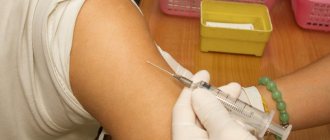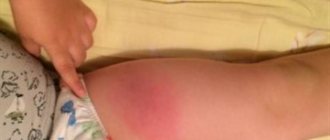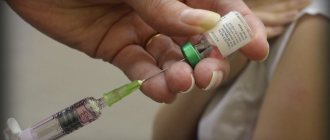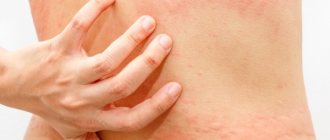Pentaxim is a French vaccine popular in many countries. Its manufacturer is Sanofi Pasteur. In Russia, the drug has been used since 2008. Many people choose this vaccination as an alternative to the domestic DPT drug.
It protects against tetanus, polio, diphtheria, hemophilic diseases, and whooping cough. Parents who decide to inject the French drug for the first time have a question about what complications Pentaxim can cause.
Instructions for use of the vaccine
Pentaxim contains bacterial toxoids and weakened viruses. The package includes a bottle with lyophilisate and a syringe with an injection solution. Before use, both formulations are mixed and administered intramuscularly in a dosage of 0.5 ml. To form stable specific immunity, the child must receive 4 injections of the French vaccine.
Inject Pentaxim according to the National Immunoprophylaxis Calendar according to the following scheme:
- first dose – at 3 months;
- the second - at 4.5;
- third - in six months;
- fourth - per year.
The doctor may choose a different immunization regimen. For example:
- option number 1 . Three vaccinations are given at two-month intervals, starting at 60 days. Then they are revaccinated at 1.6 years;
- option number 2 . Pentaxim is injected three times at 30-day intervals, starting at two months. The fourth dose is given at 1 year and 4 months;
- option number 3. The vaccine is given at 3, 4, 5 months and revaccinated a year later.
Pentaxim combines well with other vaccines. For example, it can be given at the same time as the hepatitis B vaccine.
The French vaccine is allowed to be used from two months to five years. For children under two years of age, the drug is injected into the middle third of the anterolateral surface of the thigh. For older children, an injection is given into the deltoid muscle of the shoulder.
Is it included in the National Vaccination Calendar?
The national vaccination calendar is a document that regulates the timing and types of preventive immunization provided free of charge under the compulsory health insurance program for Russian citizens. The National Calendar was approved by order of the Ministry of Health of the Russian Federation No. 252n dated March 21, 2014.
According to the schedule, children are required to be vaccinated against tetanus, whooping cough, polio, diphtheria, and hemophilic pathologies. Pentaxim is included in the National Vaccination Schedule and protects against all the diseases listed above. The French vaccine consists of a suspension for intramuscular injection and a lyophilisate for preparing a solution.
Vaccine Pentaxim
The syringe with liquid contains the following elements:
- acellular pertussis component in an amount of 25 mcg;
- tetanus toxoid at a dosage of 40 IU;
- diphtheria toxoid with a concentration of 30 IU;
- inactivated polio virus of three strains in quantities of 40, 8 and 32 units;
- hemagglutinin filamentous;
- acetic acid;
- aluminum hydroxide;
- formaldehyde;
- distilled water;
- Hanks Wednesday.
Ingredients of the powder for preparing the injection solution:
- Hib component in the form of a polysaccharide combined with tetanus toxoid in an amount of 10 mcg;
- sucrose;
- trometamol
Pentaxim helps correct immune processes. When antigenic material enters the blood, the body begins to actively produce antibodies, which persist for a long time and prevent the development of infectious viral pathologies.
The use of Pentaxim according to the schedule established by the National Vaccination Calendar makes it possible to reduce the incidence of diphtheria, polio, whooping cough, tetanus, as well as pneumonia, meningitis, septicemia, otitis, arthritis and other pathologies caused by hemophilus influenzae infection serotype B.
Contraindications for use
Any medication has contraindications. The list of prohibitions on the use of Pentaxim is much smaller than that of domestic vaccines. Nevertheless, you need to be aware of all the restrictions so as not to harm the child’s health.
Contraindications to the use of Pentaxim:
- encephalopathy in the progressing stage;
- intolerance to vaccine components;
- development of severe adverse reactions to a previous vaccination;
- increased body temperature;
- allergy condition;
- tendency to seizures;
- prematurity;
- acute course of an illness of an infectious or non-infectious nature;
- hypotonic-hyporeactive syndrome;
- immunodeficiency state;
- exacerbation of chronic pathology;
- hypersensitivity to polymyxin B, neomycin or streptomycin.
If you vaccinate your baby if there are contraindications, he may not tolerate immunization well: he will experience severe side effects.
Vaccination should be carried out with caution in children with plasma coagulation disorders. This is due to the high risk of bleeding when giving an injection.
Relevance of Pentaxim vaccination for children under one year of age
From birth, children become susceptible to various infectious and viral diseases. The immunity of infants is not fully developed. Therefore, it is important to protect the baby as much as possible from infection with dangerous pathologies. It is advisable to vaccinate children under one year old with Pentaxim.
Unlike DTP, this drug is well tolerated and does not cause complications. The French vaccine is suitable for immunizing babies over two months of age. Many parents decide to replace the domestic vaccine with an imported one.
According to reviews from mothers and fathers, after Pentaxim there is no fever, the injection area does not swell or turn red. The relevance of immunization with Pentaxim for children under one year of age is due to the poor epidemiological situation in the country and the high susceptibility of the child’s body to infection with infections and viruses.
The popularity of the drug is explained by its following advantages:
- polyvalency. The drug protects against five dangerous infectious viral diseases at once;
- low antigenic load on the body. Achieved due to the content of toxoids and weakened viruses in the product;
- reducing the number of visits to the clinic (several injections of Pentaxim are needed to form stable immunity);
- minimal likelihood of developing vaccine-associated infectious diseases;
- low reactogenicity. It is caused by the absence of merthiolate in the preservative, which is a mercury-containing substance and can negatively affect the functioning of the nervous system. Also in Pentaxim, the pertussis component is devoid of the cell membrane, which usually causes severe side effects and irreversible complications in children. The risk of developing negative reactions from the French vaccine is 0.6%;
- reliable protection against whooping cough. The effectiveness of DPT in preventing infection with pertussis bacteria is lower.
The only drawback of vaccination with Pentaxim is the high cost of the procedure. Immunization with domestic drugs in local clinics is carried out free of charge.
Side effects after Pentaxim in children
After the introduction of antigenic material into the body, an immune response develops. This is usually accompanied by certain symptoms.
Vaccine Pentaxim
So, the baby’s temperature may rise to 37.5 degrees, a headache may appear, and sleep may be disturbed. These phenomena are considered completely normal and indicate the beginning of the production of antibodies and the formation of specific immunity.
According to reviews from parents and doctors, Pentaxim is easily tolerated. The low reactogenicity is explained by the absence of whole cells of pertussis and merthiolate, which are present in DTP and often cause the development of severe disorders of the central nervous system and brain.
Possible adverse reactions of Pentaxim:
- compaction, redness, swelling (up to 8 cm in diameter), pain at the injection site;
- general malaise;
- fever;
- nausea;
- runny nose;
- cough;
- moodiness;
- loss of appetite;
- insomnia;
- prolonged crying;
- diffuse swelling of the extremities;
- hives;
- prolongation of the intervals between respiratory movements (occurs in premature babies);
- neuralgia;
- cyanosis;
- bowel disorder.
Such adverse reactions are not dangerous to health and usually go away on their own. If symptoms are severe, the pediatrician selects drug treatment.
Vaccination scheme
The course of primary vaccination consists of 3 doses of vaccine and revaccination. Immunization schedule: first administration, then the second after 45 days from the first, then the third after 45 days from the second and revaccination a year after the third is completed. The use of the vaccine is not clearly related to age. It is important to comply with vaccination dates. If the deadlines are extended, vaccination will not be resumed.
Violation of the vaccination schedule can lead to a decrease in the intensity of immunity to the components of the vaccine. The hemophilic component of the Pentaxim vaccine for children over one year of age is administered once. Therefore, as soon as a child over one year old is injected with the Pentaxim vaccine with a hemophilus influenzae component, it is the last one for immunization against hemophilus influenzae infection. Further prevention of diphtheria, whooping cough, tetanus and polio with the Pentaxim vaccine in a child older than one year is carried out without the use of the hemophilic component.
How many days do side effects last?
Side effects may last for different periods of time, depending on the individual characteristics of the body. Local reactions in the form of redness and swelling in the puncture area disappear 1-3 days after the injection.
A lump in the injection area is sometimes observed for up to five days. Fever, upset stool, headache, moodiness may last for several days. Diffuse edema may develop after administration of Haemophilus influenzae type B polysaccharide.
The reaction most often occurs during the first vaccination and goes away on its own without consequences, after a couple of hours. Parental actions also influence how many days side effects last.
For example, if, when the temperature rises, you give the baby an antipyretic, and in case of local reactions an antihistamine, the condition can normalize within 24 hours. But pediatricians do not recommend using medications for mild symptoms, as they create additional stress.
Adverse reactions of a neurological nature can last a long time. To eliminate them, medication is usually necessary.
Vaccine Pentaxim - reviews
Annetka1987
https://irecommend.ru/content/vybiraite-tolko-luchshee
Advantages:
- better tolerated
- one shot, not 2
Flaws:
- high price
Of course, like any mother, I thought about vaccinations when we were 3 months old. Of course, I scoured the entire Internet: read reviews, articles, and of course listened to the opinion of Dr. Komarovsky (I love his advice). For myself, I decided not to get vaccinations at the clinic under any circumstances, and certainly not from a domestic manufacturer, since they are less well tolerated than imported ones. So, we did it at the vaccination center and Pentaxim, which includes DPT, polio, and Hib, but for heppatitis we did it separately, injected into the leg. It’s very convenient that everything is in one ampoule and also DEAR MOMS, DO NOT ALLOW DTP INJECTION IN THE BUTTOCK !!! IT IS NOT RIGHT! Of course we cried, well, there’s no place without it. After the vaccination, I felt a little sleepy, my temperature rose a little, but so far everything is fine. I would like to say separately that before getting vaccinated, please take all the necessary tests: blood, urine, go to a neurologist, consult a therapist; everyone should have an individual approach, but in the end, if you don’t trust your local pediatrician, find a good specialist and get imported vaccines, they are easier to tolerate and this way you will reduce your risk of side effects, and they are known to be deplorable. Good luck to everyone, take care of the health of your children and your nerves!
Aniram
https://irecommend.ru/content/reshat-roditelyam
Advantages:
- one shot, not 2
To be honest, I don’t even know whether to praise this vaccine or not. I gave my first child the usual domestic DPT vaccine. The first two vaccines went unnoticed, but we noticed the third one, as there was fever, swelling of the leg, and redness. For a long time I thought about whether to make it domestic or imported for my second child. The first child seemed to bear everything well, but everyone around them says that they are doing a lot now, they have heard a lot of sob stories. In general, my husband and I re-read the entire Internet, talked with doctors and friends and decided to make an imported one. We received the first vaccine and it was tolerated well. After the second vaccine I had fever and diarrhea for two days. The third one was also well tolerated. We were pleased with the vaccine.
squirrel310
https://otzovik.com/review_2162169.html
Attention!
Before using medications, consult a specialist!
Advantages:
- fewer complications
- less painful
Flaws:
- paid vaccine, not always available
Good day to all!
All children need to be vaccinated, everyone knows about this. But which one and when - this is decided individually, because all children are different and the dates are postponed for medical reasons. We had this kind of honey. withdrawal, and therefore vaccination with DTP (adsorbed pertussis-diphtheria-tetanus vaccine) began after a year.
The DPT vaccine itself is different and, accordingly, the reaction to it is also different. Domestic-made DPT is given in a children's clinic completely free of charge, but a fairly severe high temperature, terrible pain at the injection site, headaches are tolerated and these are the most common symptoms. And there are also cases of paralysis of the legs after vaccination. Scary…
You can also get DPT Pentaxim vaccination at the clinic for a fee. This type of DTP is much easier to tolerate (the vaccine is inactivated or “killed”). The cost of such DTP is 1530 rubles. Not much for the fact that the baby did not suffer from vaccination. DPT vaccination takes place in three stages with intervals of 45 days. The injection is given in the leg in the thigh, first the nurse shows the package (name, expiration date), warms it a little in the hands (the vaccine is stored in the refrigerator). Since the vaccination itself is very painful (I recently had it up to my shoulder blade for diphtheria and it hurt for several days), the children naturally cry in the office. My son endured it calmly and did not cry.
After vaccination, the following recommendations are given: do not bathe for 24 hours, do not wet the injection site, do not rub, do not scratch, make an iodine net at night, give a quarter of a Suprastin tablet 2 times a day for 2 days and 1 time a day for night "Nurofen". These recommendations were quite enough for us and all 3 vaccinations for my child, aged from one to one and a half years, went well without complications.
Vaccination with DPT Pentaxim is of high quality, less painful, with minimal pain. I recommend it to all parents for their children!
Anyuta
https://www.babyblog.ru/community/post/diseases/1221058
Both daughters were given Pentaxim for hemophilus influenzae. TTT, everything is ok. No consequences at all. The last time the little one had a lump at the injection site, but it didn’t bother her, I just felt it.
Natalia
https://www.babyblog.ru/community/post/diseases/1221058
They made Pentaxim with a hemophilic component. Basically, there was no reaction. The only thing is that on the day of vaccination, my daughter complained that her leg hurt. But it was impossible to understand what hurt - the whole leg or just the injection site. Two hours later.
Complications after Pentaxim vaccination requiring medical attention
Some children are highly sensitive and develop serious complications requiring medical attention after receiving the Pentaxim vaccine. According to reviews from parents who observed their baby after immunization, severe adverse reactions developed in less than 1% of cases.
During the entire period of Pentaxim vaccination, not a single death was recorded. The number of calls to doctors for help due to the development of post-vaccination complications is minimal. Therefore, parents should not worry about the tolerability of Pentaxim. But it is useful to know what reactions this drug can provoke.
Possible complications after vaccination:
- allergic manifestations . These are the most dangerous conditions that require urgent medical attention. We are talking about Quincke's edema and anaphylaxis. If measures are not taken in a timely manner, the child may die;
- temperature rise to 39-40 degrees . Against the background of fever, convulsions and hallucinations may appear. If you do not help the baby, there is a risk of death;
- Guillain-Barre syndrome. This is an acute autoimmune inflammatory polyradiculoneuropathy. The pathology is manifested by sensory disturbances and autonomic disorders. This condition does not lead to death. But if the child is not treated, paralysis may develop.
If complications develop, you should not try to eliminate them yourself. It is necessary to seek medical help as soon as possible.
How to avoid the negative consequences of vaccination?
Dr. Komarovsky notes that with revaccination there is a tendency to increase the incidence of general disorders and disorders.
Therefore, if a child had mild side effects from the first vaccination, then after the second or third injection his condition may worsen significantly. Therefore, it is important for parents to understand how to prevent the development of unwanted symptoms after immunization.
Measures to prevent negative consequences of vaccination:
- Do not bathe the baby until the wound formed during the injection heals and the condition returns to normal. If you wet the puncture area, infection will get there and severe inflammation will occur. Taking a shower at elevated temperatures can cause your child to catch a cold. In these cases, all protective forces will be aimed at fighting the disease, and not at forming specific immunity;
- do not walk with your child in crowded places. It is important to avoid contact with other children and adults to reduce the chance of infection. During the post-vaccination period, the body weakens and you can get sick. It is better that the child does not attend kindergarten, school, or communicate with friends for a couple of days;
- Do not allow the child to rub or scratch the area where the injection was given. It is prohibited to treat the injection site with ointments or lotions in order to speed up healing. This may cause allergies;
- if the baby is breastfed, then the mother should not introduce new foods into her diet;
- to prevent fever, some pediatricians advise giving the baby an antipyretic for several days after vaccination;
- Sensitive children are advised to take antihistamines three days before and after the procedure.










